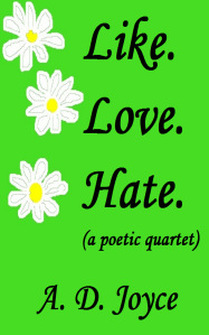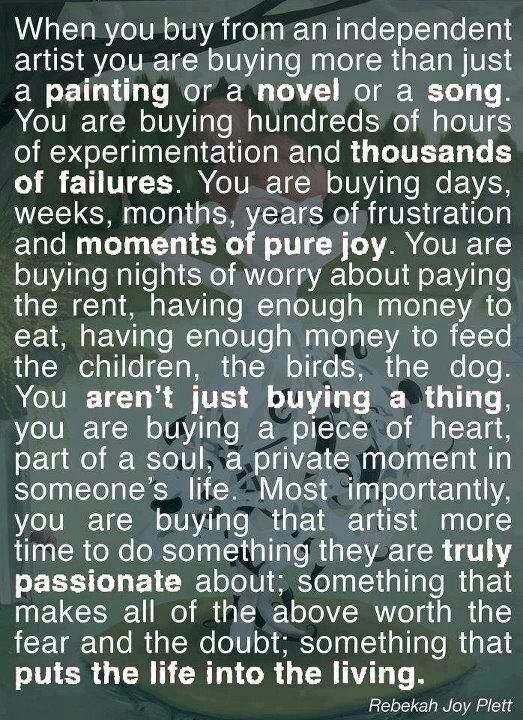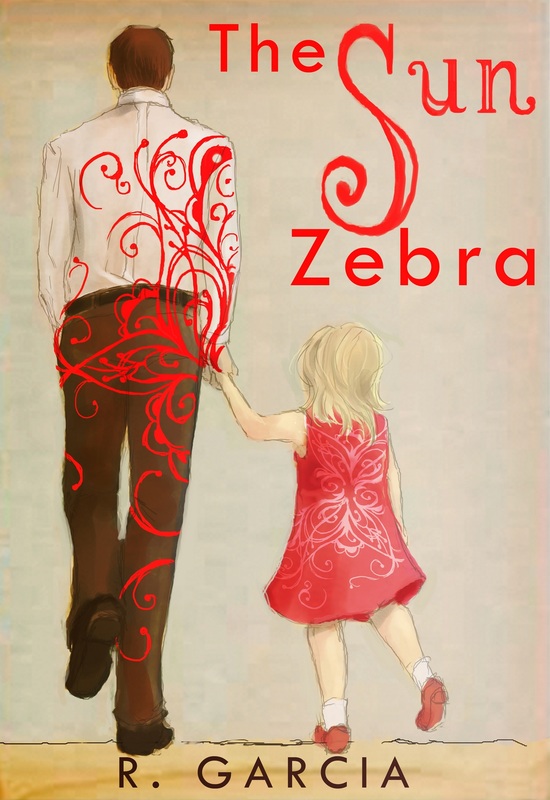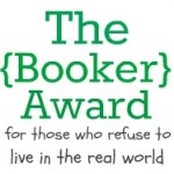If you like this blog you can have links to each week's posts delivered to your e-mail address. Please click here.
|
***
If you like this blog you can have links to each week's posts delivered to your e-mail address. Please click here.
0 Comments
 In the introduction to this book, the author Adrienne Joyce wonders if “like,” “love,” and “hate” are the basis of every other emotion there is, and then she sets out to examine them in a quartet of poems. She first does this by viewing these emotions as a whole in the eponymous poem “Like, Love, Hate.” This is the sort of poem that challenges the word-association ability of poets. The author wrote down a list of several things that she likes, loves, and hates, and then proceeded to string them together. This is how she comes up with phrases like “hope sundae,” “the ocean oozing from the sides of a karma sandwich,” or “sweeping up the dust, lies, and Tuesdays.” I love it when poets do this but still succeed in conveying a clear meaning with the resulting poems, which is something Adrienne Joyce manages to do very well. After giving us the bird’s eye view, the author then proceeds to dissect each of these emotions and consider them in isolation. A girl shopping at a store with her mother (Victoria’s Dress) represents “Like,” a lover reflecting on the many faceted enigma of love (The Buddha of Questions) represents Love, and my favorite, “The Beginning and the End,” represents “Hate” and for a very good reason. I finished reading this last poem and it must have been almost a minute before I realized I had stopped breathing. The book is very well made and formatted. All the links work and the cover (which is related to one of the poems) is simple but effective. My only qualm is that it was too short: I wanted more! *** If you like this blog you can have links to each week's posts delivered to your e-mail address. Please click here. At the beginning of the KDP Select Program it was easy to climb up the Amazon charts with a single free promotion and linger on those lofty heights for a while, but that has all changed. Amazon, perhaps concerned over how many low priced books coming out of their free promotions were displacing higher-priced titles, has changed the algorithms to make it harder for free books to climb the charts. Nowadays an often quoted figure in the blogosphere is that 10 free downloads counts for only1 sale. Amazon is also tinkering with their system to decrease the visibility of free books, and it has also biased their ratings away from lower-priced books, effectively signaling the end of the 99 cent book era.
This has created a situation where to have a chance of reaching the top of the best seller’s lists a book has to gather free downloads in excess of tens of thousands, and the only way to achieve this is to make sure that as many people as possible know that a book is being given away for free. Thus the fight for visibility in the Kindle store is now carried out at the level of the blogs that advertise free promotions to readers. Authors used to be able to list their book for free in several blogs. This is still happening in several automated blogs that list free books as they become available, but the turnover of books is so high that this advertising option has a limited effect. The next option is blogs that accept submissions of books that will be free and feature them in their pages. However these blogs have had to raise their acceptance standards due to the large number of submissions, and now books are often listed only if they have a rating of 4 stars on ten or more reviews. The competition is so fierce to promote free books that authors are resorting to paid advertising in blogs, and many blogs whose promotional services in the past were free now have paying options or have switched to only paying options altogether. As the avalanche of free books keeps increasing, the only way to have a decent chance at a successful free promotion will be to pay for it, and this will only add to the costs of a book. Taking into account that in the majority of the cases the bottleneck for any measure of book selling success is not how good a book is (within reason of course) but rather its discoverability, it is very important that authors consider how much of their budget they will spend on editing, formatting, and cover design vs. how much they will devote to promotion. I miss the old good old days in which making books free used to be free. Now free is getting expensive! *** If you like this blog you can have links to each week's posts delivered to your e-mail address. Please click here. "The Howl," performed by Tucker. Piano Concerto, a piacere, espressivo, con urlo! ***
If you like this blog you can have links to each week's posts delivered to your e-mail address. Please click here. I have been advised not to blog about politics, religion, or any other controversial topic lest I want my blog’s comment section turn into a name-calling brawl. However, this is the Eclectic Life blog and everything is fair game. Hopefully I can address what I have in mind in an evenhanded fashion.
We have all read about the analyses of the election. It has been said that Romney and the Republicans lost because the electorate tuned out to be more diverse than they had expected, and that Obama and the Democrats won because of the vote of minorities, especially Hispanics. To this you probably have to add the famous Romney leaked comment about the 47% of Americans that support Obama, or Romney’s disastrous implementation of project Orca on Election Day. There was also the issue of the bruising Republican primary which left Romney with very little cash making him devote his time to fundraising while Obama was pounding the airwaves in swing states with ads defining Romney in a negative fashion. Finally we have Romney’s recent analysis that Obama won because he gave gifts to voters. Regardless of the merits of all these explanations, I spotted something interesting in the number of votes for president and how they changed from the past election to this one (caveat: the final vote tallies for 2012 have not yet been officially certified). Popular Vote 2008 Popular Vote 2012 Difference Obama: 69,498,215 Obama: 62,284,362 -7,213,853 McCain: 59,948,240 Romney: 58,906,319 -1,041,921 Other: 1,947,535 Other: 1,946,418 -1,117 Total: 131,393,990 Total: 123,137,099 -8,256,891 In the last column you can see some numbers that are negative for both parties. From 2008 to 2012 Obama lost 7,213,853 votes. These votes did not go to third party candidates (Other) because the tally from 2008 to 2012 remained more or less the same. If these votes Obama lost had gone to Romney, we can say with confidence that he would have won at least the popular vote and probably the election. But here is the thing; these votes didn’t go to Romney either. In fact Romney received fewer votes than John McCain received in 2008! So clearly this time around there were millions of people that were disillusioned enough with Obama to not vote for him but still unconvinced enough to grant their vote to Romney. What happened to these 7 million plus voters and more importantly, who are they? Are they an identifiable group or do they represent a cross section of the American public? A certain number of these voters probably died, but this is an unlikely explanation as to why they vanished altogether. All the analyses I have read are based on the makeup of the population that cast their votes. The pundits point out that both Romney and Obama were supported strongly by their traditional constituencies, but no one seems to be discussing anything about the voters from the past election who did not vote in this one. I think that Republicans should be asking who these voters are, and why if they didn't vote for Obama they also didn't vote for Romney. Likewise, Democrats should also be concerned about losing more than 7 million votes from one election to another because this results in a much closer race making it possible for a Republican candidate with the right mix of charisma and campaign strategy to win. The above is of course only my opinion. What do you think? *** If you like this blog you can have links to each week's posts delivered to your e-mail address. Please click here. This past Sunday November 18 my book The Sun Zebra turned one year old! I had a lot of fun writing about the magical adventures of Nell and her family, but other aspects of putting this book together, publishing it, and promoting it have been a different ball of wax. I have learned a lot about the process during this time, and I keep learning because the whole self-publishing universe continues to change. Some things that were valid a while ago don’t work anymore, and new and exciting things are appearing all the time. Like most authors I am still trying to find “the formula” if such a thing even exists.
One year ago I self-published my book while trying to curtail any unrealistic expectations by telling myself over and over that my sales would at best be modest. I was not to be disappointed. My book started slow and then went slower and finally dipped into the primordial ooze (the long tail also known as low-sales limbo) with hundreds of thousands of other books. But along came the KDP Select Program that gives authors the ability to give their books away for free. So I enrolled and did my first free promotion with a smile. I gave away a paltry 147 copies of my book in January, which did not gather me a single sale: utter and complete disaster. I fought my depression over my pathetic numbers (which totaled 25 sales over 5 months) and fixed problems with my book, my author image, and my marketing approach. My second KDP promotion in April was a success as I gave away more than 19,000 free copies of my book. Even though The Sun Zebra reached #9 in the Free Kindle Store and garnered me 240 sales and 54 borrows, but it still did not gain a lot of staying power. A third promotion in July was a bust that awakened me to the realities of the effect of seasonality on free book giveaways plus Amazon also changed the algorithms they use in weighing the sales equivalent of a free book download. My fourth promotion just finished last Sunday November 18 and soon I will know whether that went well or not. Either way I will likely learn some more! All in all for the past year I have ended up with 303 sales and 58 borrows. If you take into account the dollar amount of each borrow compared to the percentage of royalties I earn from the sale of each copy of my book, the number of sales plus “sale equivalents” comes to about about 514. Clearly the Amazon Prime program has been a great asset for me. As I expected my numbers have been modest, but the important thing is that The Sun Zebra didn't cost me anything to publish and the money that I have left over from paying for promotions will be enough to pay for my next book, which will hopefully be out in the first few months of next year. I want to thank all the extraordinary people who helped me in this self-publishing project with their constructive criticism, editing, and opinions, or by writing reviews or helping me with promotion. You are all wonderful, take care, and keep on reading and writing! Rolando *** If you like this blog you can have links to each week's posts delivered to your e-mail address. Please click here. Well, it finally happened. Remember all the furor that was stirred when some authors created sock puppet accounts to write glowing reviews of their own work, and another author paid for fake reviews? The issue hit the Indie blogosphere like a ton of bricks. Everyone was outraged! How could this have happened? Petitions were circulated. Pundits pontificated. Nasty comments were left on the Amazon pages of the books of the offending authors. And then the worst of all things happened: the brouhaha reached the upper echelons of Amazon’s management.
Now reviews are disappearing right and left seemingly without reason. Many authors are reporting that several of the reviews that they have received from or have given to fellow authors are gone. And when they write to Amazon requesting an explanation all they get is an e-mail with this quote: We do not allow reviews on behalf of a person or company with a financial interest in the product or a directly competing product. This includes authors, artists, publishers, manufacturers, or third-party merchants selling the product. In other words, as a published author you cannot review the book of a fellow author because your book is competing with his/her book. If Amazon had asked me or any other Indie author, we would have told them that our fellow authors are NOT our competitors. We are all in this self-publishing adventure together and we support each other. But company policies designed to quell public uproars are not known for the intelligence behind them. They are quick fixes put in place so people in the company can claim they did something and then move on to deal with more important matters. There is a reality: books need good reviews and they need them fast. The problem is that reviews by what I call people familiar with your work (first tier reviewers), but which other people call “friends,” more often than not include fellow authors. These people are the most readily available and fastest source of good reviews a beginning author can have. Dedicated (second tier) reviewers may take many months to review your book, and third tier reviewers (unsolicited reviewers) can be few and far between and a total wild card. Thus Amazon’s policy of review removal strikes by and large at the most important source of reviews for a beginning author: other authors. So, should authors stop reviewing the books of other authors? I think not. This policy is not only unfair, but it also ignores the true bonds that bring us Indies together. I have already explained my position on the so-called reviews by “friends.” I don’t think they are unethical as some people claim. A review of a friend’s work can be as honest as reviewing the book of a stranger. But what can we do about it? By all accounts Amazon is policing reviews using a bot (a program), which makes sense because there are tens of millions of reviews. So the easiest thing to do is to keep your reviewing account and your author account at Author Central separate. Use your reviewing account to purchase books and review, and your publishing account to publish. Also when you leave reviews do not show familiarity. Refer to the author either as “the author” or by their first and last names (i.e. John/Jane Doe), and if you did not buy the book include a statement to the effect that you received the book in exchange for an honest review. Finally, when the next moral or ethical outrage comes around, think twice before becoming involved in the screaming. Remember: Amazon may listen. What do you think? *** If you like this blog you can have links to each week's posts delivered to your e-mail address. Please click here. In the suburbs of the town of Kutna Hora, which located about 43 miles away from Prague, the capital of the Czech Republic, you will find a church called the Church of All Saints that looks perfectly normal…from the outside. Once you go inside you discover why the church is called the Sedlec Ossuary or Church of Bones. In a chapel inside the church the bones of more than 40,000 people have been used as decorations for the walls forming things such a coat of arms or a magnificent chandelier. These bones are no imitations. Each of those craniums you see in the picture or the video below was a living human being a few hundred years ago. Some people find this objectionable, but where would you like your mortal remains to rest: inside some dark cold hole in the ground or as art on the walls of a church? What do you think? ***
If you like this blog you can have links to each week's posts delivered to your e-mail address. Please click here.  Employing the motto that “mamas always write,” several California moms got together and started a literary group called the Write On, Mamas! In the time they have been together they have done amazing things, and the group now has over 25 members who regularly attend the group’s monthly meetings. The Write On, Mamas! were recently honored to participate in Lit Crawl, which is a fantastic and hilarious literary pub crawl in the Mission in San Francisco, as the culmination of Lit Quake (which is the largest literary festival on the West coast). The Write On, Mamas! have now decided to publish a book. It is going to be an Anthology of how they all started writing and why they continue to write. There are really interesting stories, from one mom who writes about the abuses to women in Congo, to another who writes about when your kids have left home. They already have an agent who is interested in their project and a high profile editor who will help them with their book. But in order to publish this book, they need more help. The Write On, Mamas! have started an Indiegogo Campaign to raise funds for this project. They have already raised more than 30% of their goal of $15,000, but they need more help, and for as little as $25 you can get the first level of the different Perks they offer. The campaign ends on November 14, but even if you are not able to give any money, you can really help them by just going to their Indigogo campaign page and sharing their link on Facebook or Twitter or any other social media. The more traffic they drive to their Indiegogo page, the more prominently their campaign will be featured on Indiegogo’s pages. So please consider making a donation or at least liking, tweeting, or sharing on Google Plus the Write On, Mamas! Indiegogo page. Thank you for helping this great group of writing moms! *** If you like this blog you can have links to each week's posts delivered to your e-mail address. Please click here. When an author writes a series of books in one genre he/she develops a fan base. This can be both a blessing and a curse. It can be a blessing because the author has a group of people out there waiting to buy the next book. But it can be a curse because invariably these fans expect more of the same. Some authors are happy to oblige. For example Lilian Jackson Braun wrote a series of “The Cat Who…” mysteries till the end of her life. But what if an author wants to write something very different? The problem with this is that readers will not like it. This may have happened recently to no other than the author of the Harry Potter books: J. K. Rowling.
As many of you know, the Harry Potter books began as children’s books and progressively turned into books for adults. But still, apart from the violence and darkness that you get in the never-ending battle of good vs. evil, the books by and large had nothing objectionable. There was kissing, some veiled references to couples hanging out together, and the only curse words in the series were “effing”, “damn,” and “bitch” (this last one only said only once). After finishing the Harry Potter books Rowling wanted to write something very different, something more “real.” And that she did. Her newest book is called the Casual Vacancy. I have not read it because I think the e-book is overpriced, but according to several reviews I’ve read, it is set in the microcosm one finds in a small town with all its maladies. The book has drug addiction, suicide, rape, domestic violence and abuse, adultery, and pornography. The “F bomb” is dropped everywhere, there is a vivid description of a used condom, and a reference to a “miraculously unguarded vagina” that has gone viral on the internet. By all accounts the book seems to be good. It has received very high praise from many major outlets of the publishing world, and it contains very sharp social commentary. Rowling was not naïve about what she was doing. This IS what she wanted to write about, and she knew many readers would not like it, which is exactly what happened. Even though readers knew this wasn’t Harry Potter, many still expected the high-flying themes and heroics of the Potter books, not the bleak landscape that they encountered in The Casual Vacancy. On Amazon The Casual Vacancy has a rating of 2.9 on 1,382 reviews. On Goodreads the rating is more favorable; 3.4 on 9,622 reviews. Compare these figures with the last book of the Harry Potter series (Harry Potter and the Deadly Halows) which has 4.6 on 3,766 reviews on Amazon and 4.53 on 741,168 reviews on Goodreads. Regardless of this, the book has become a best seller. However, I wonder how many of the readers turned off by this book will read more of her writing in the future? Of course Rowling is rich and has a huge fan base. She can afford to lose some readers. But the same may not be the case for lesser known authors with smaller fan bases. How can a writer harmonize his/her desire to write something different with the desire of the fans for more of the same? What do you think? *** If you like this blog you can have links to each week's posts delivered to your e-mail address. Please click here. |
I am a tinker, tailor, BlogrollLaura Novak
Barbara Alfaro Suzanne Rosenwasser Sunny Lockwood Christine Macdonald Jennie Rosenbaum Kristen Lamb Joe Konrath Sweepy Jean Ingrid Ricks The Jotter Robert David MacNeil Molly Greene The Passive Voice Third Sunday Blog Carnival Marilou George Laura Zera Jeri Walker-Bickett Lia London Categories
All
Archives
April 2020
|




 RSS Feed
RSS Feed



